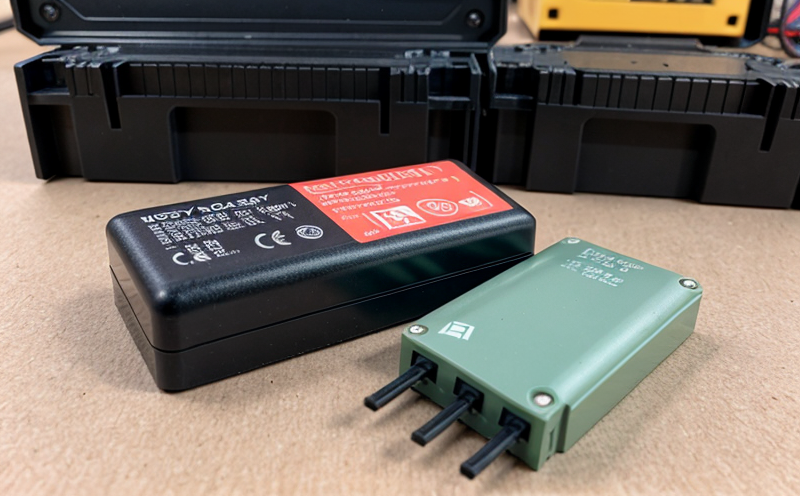ASTM E2706 Performance Testing of Rechargeable Lithium Battery Packs
The ASTM E2706 standard provides a comprehensive framework for testing the performance characteristics of rechargeable lithium battery packs. This service is essential for ensuring that batteries meet stringent safety and operational requirements, particularly in sectors such as automotive, aerospace, and consumer electronics.
Rechargeable lithium-ion (Li-ion) batteries are critical components in modern electronic devices due to their high energy density and longer cycle life compared to other battery technologies. However, these advantages come with the challenge of ensuring consistent performance across various operating conditions. ASTM E2706 focuses on evaluating both static and dynamic performance parameters, which are crucial for the safety, reliability, and longevity of rechargeable lithium batteries.
During testing according to ASTM E2706, several key parameters are assessed:
- Cycling Capacity: This measures how many charge-discharge cycles a battery can undergo before its capacity drops below a specified threshold. It is crucial for determining the battery's operational life.
- Discharge Rate: The rate at which the battery discharges under specific conditions, often measured in milliampere-hours (mAh).
- Charge Efficiency: This parameter evaluates how efficiently a battery converts electrical energy into chemical energy and vice versa during charging.
- Internal Resistance: Measuring the internal resistance helps assess the health of the battery, as higher resistance can indicate degradation or damage.
The testing process begins with careful preparation of the lithium-ion batteries. This involves ensuring that each cell is charged to a specific state-of-charge (SOC) and then placed in a controlled environment for conditioning. Once conditioned, the batteries undergo various tests aimed at simulating real-world usage scenarios.
ASTM E2706 specifies precise procedures for conducting these tests, including the use of specialized equipment such as battery test stands, multimeters, and data acquisition systems. The results are meticulously recorded and analyzed to ensure compliance with the standard's requirements.
| Standard | Description |
|---|---|
| ASTM E2706 | Standard Practice for Performance Testing of Rechargeable Lithium Battery Packs. |
| ISO 16750-3 | International standard for road vehicles – Electric and hybrid electric powertrain – Part 3: Battery requirements. |
The results of the ASTM E2706 testing are critical for quality managers, compliance officers, and R&D engineers. By adhering to this standard, manufacturers can ensure that their products meet not only regulatory requirements but also industry best practices. This enhances customer confidence and ensures product longevity in demanding applications.
Applied Standards
| Standard | Description |
|---|---|
| ASTM E2706 | Standard Practice for Performance Testing of Rechargeable Lithium Battery Packs. |
| ISO 16750-3 | International standard for road vehicles – Electric and hybrid electric powertrain – Part 3: Battery requirements. |
Why Choose This Test
The ASTM E2706 performance testing of rechargeable lithium battery packs is a critical service for several reasons. Firstly, it ensures that batteries meet the highest safety and operational standards, which is particularly important in high-risk environments such as aerospace and automotive industries.
Secondly, this testing helps manufacturers identify potential issues early in the development process, allowing for necessary adjustments to be made before product release. This proactive approach not only saves time and money but also enhances overall product quality.
Moreover, compliance with ASTM E2706 can significantly reduce liability risks by demonstrating that products meet or exceed industry standards. This is especially valuable in markets where stringent regulatory requirements are enforced.
The test results provide detailed insights into the performance characteristics of lithium-ion batteries, enabling quality managers and R&D engineers to make informed decisions about product design and manufacturing processes. The data generated from these tests can be used to optimize battery performance, extend operational life, and improve overall safety.
International Acceptance and Recognition
The ASTM E2706 standard is widely recognized and accepted in the global market. Its adoption by various industries underscores its importance and reliability. Many countries have incorporated the use of ASTM standards into their national regulations, ensuring that products tested according to this standard are universally compliant.
For instance, major automotive manufacturers around the world adhere to these standards when testing batteries for electric vehicles (EVs). Similarly, aerospace companies rely on ASTM E2706 to ensure the reliability of batteries used in spacecraft and aircraft. The recognition extends beyond specific industries; international organizations such as ISO also reference ASTM E2706 in their standards.
The widespread acceptance of this standard ensures that products are not only safe but also meet the highest quality benchmarks, regardless of geographic location or market. This global consistency is crucial for companies operating internationally and seeking to maintain a consistent product quality across different regions.





